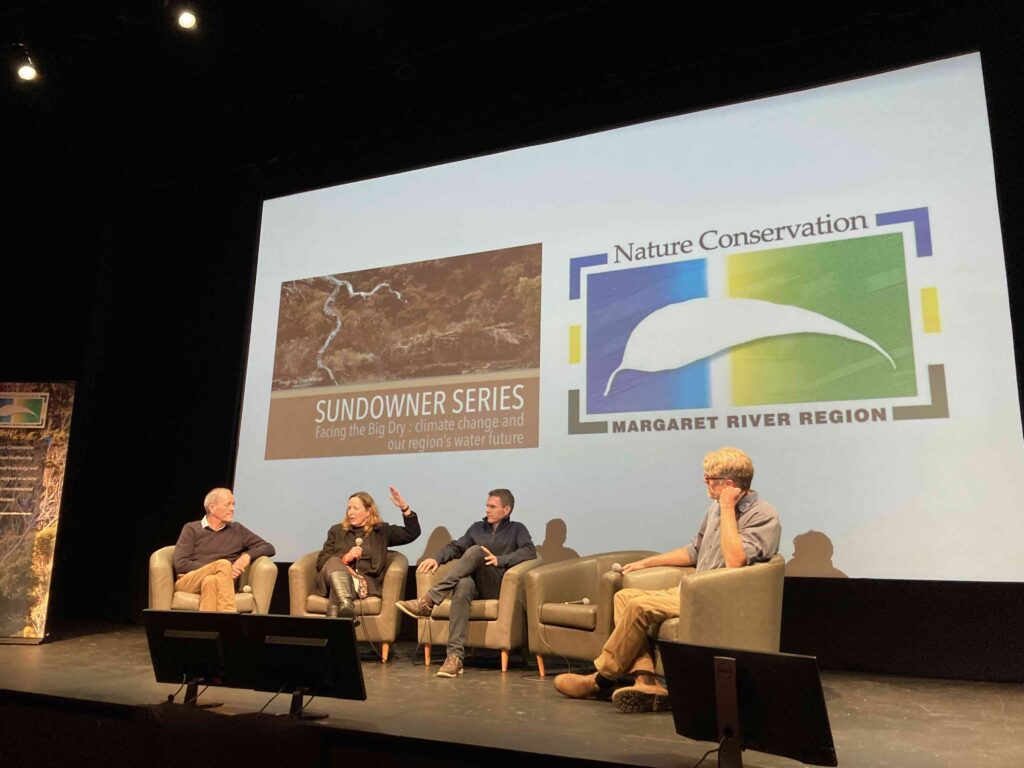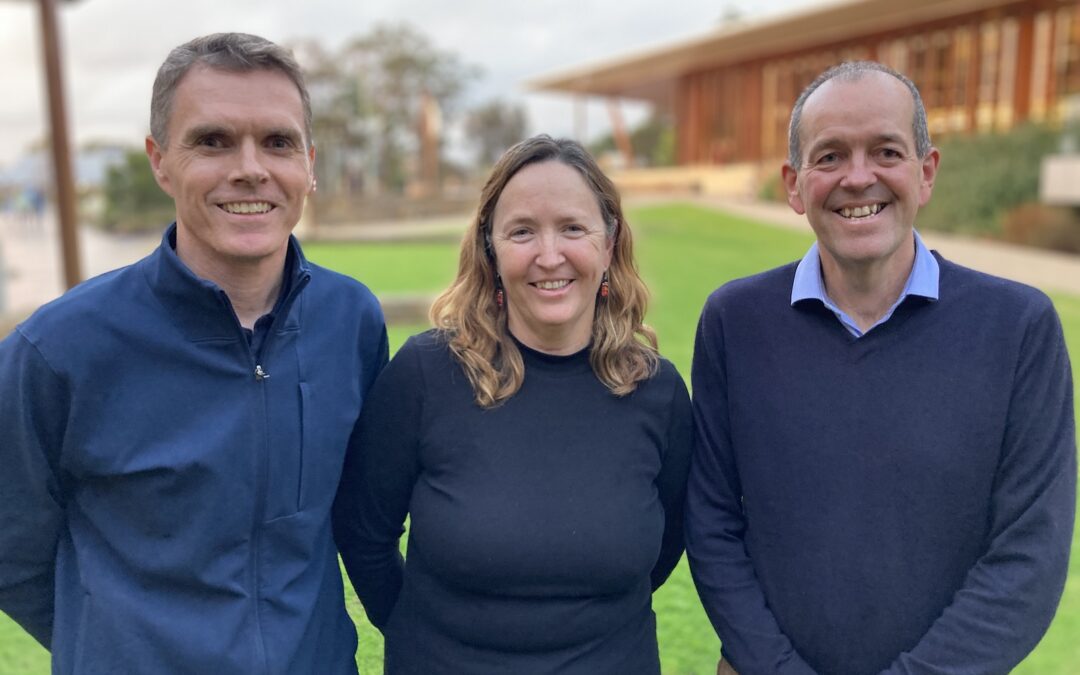Water in our drying climate is a “confronting and pressing issue – and we need everyone acting on all fronts to do what they can”, says the region’s peak conservation group.
The latest event in Nature Conservation Margaret River Region’s Environmental Sundowner Series – called Facing the Big Dry – was held last Tuesday, July 30 with an evening that tackled the issue of climate change and how it’s affecting our region’s water future.
Speakers included UWA Professor Michael Douglas, leader of the National Environmental Science Program Resilient Landscapes Hub, Department of Water and Environmental Regulation (DWER) acting regional manager Kath Lynch, and the Water Corporation’s Matthew Bowman, with an introduction and welcome to country from Undalup Association chair Zac Webb.
While winter rains are falling now, the region endured its driest and hottest 7-month period on record, with huge swathes of vegetation dying off and a heavy toll on wildlife. Where parts of the Margaret River had once flowed year-round, this year it stopped flowing for nearly six months and flow was one third of the long-term average. Research also shows groundwater recharge is at its lowest in 800 years.
Nature Conservation general manager Drew McKenzie said there was no more “confronting and pressing issue” than water as climate change happens before our eyes. He also said it was time to overhaul to the Rights in Water and Irrigation Act written in 1914, which allows direct pumping from summer refuge pools in the Margaret River under a law that is “more than 100 years old – when we need to be thinking 50 or 100 years into the future”.
Mr McKenzie said every drop saved was a drop more for the environment, and each of us can make a difference by:
- Being waterwise – such as doing a water audit, minimising use, knowing where your water comes from, and only pumping from waterways when they’re flowing
- Protecting native vegetation – such as fencing access to waterways, revegetating creeks and rivers, sticking to paths in forests and reserves, and controlling weeds
- Engaging with the issue – such as attending workshops, making submissions, advocating for good policy and spreading the word
 During his talk, UWA Professor Michael Douglas said we are now watching climate change in action with “all the hallmarks of a crisis”, including decreasing rainfall, increasing temperatures and Perth experiencing 80 per cent less stream flow in the last 50 years. He said WA now had a rapidly growing reliance on desalination, but he fears that “people just don’t have the sense of urgency and don’t realise how precious water is”.
During his talk, UWA Professor Michael Douglas said we are now watching climate change in action with “all the hallmarks of a crisis”, including decreasing rainfall, increasing temperatures and Perth experiencing 80 per cent less stream flow in the last 50 years. He said WA now had a rapidly growing reliance on desalination, but he fears that “people just don’t have the sense of urgency and don’t realise how precious water is”.
Prof Douglas said for nature and biodiversity the drying climate creates “a real crisis” in “really critical times”, with forest ecologists raising fears of forest collapse and die-off as groundwater levels drop more than 10m in some cases. He said that in terms of the climate crisis on rivers: “It’s not future, it’s now. It’s happening, and it’s happening much quicker than many people thought”, adding that the drying climate meant more competition for water from industry, farming and growers which could come at the expense of the environment.
Dr Kath Lynch zeroed in on surface and ecological monitoring of the Margaret River (Wooditjup Bilya) and discussed how DWER allocates and manages water use. She said the river had “amazing biological and ecological values” but has also been used for many decades as an important water resource supporting agriculture and public drinking supplies. She highlighted that flow in the Margaret River drops by 5 per cent for every 1 per cent decrease in rainfall.
However, Dr Lynch confirmed overall flow was down 50 per cent since 2001, while the recent dry spell was a “game changer” for authorities. “This was the year that it felt climate change happened, it’s here,” she said, adding it was the hottest and driest November-May period on record. She said we are all in “a whole new ball game” with the impacts of this dry season affecting the ecology and water users. “We need to think differently about how we manage water in a drying climate,” she said. “All of the climate models predict that the southwest of WA will become drier. We need to be adaptable, and we need really good science to inform our management.”
Meanwhile, Water Corporation South-West assets manager Matthew Bowman explained the bulk of Margaret River town’s drinking water is extracted from a bore in the Yarragadee Aquifer and stored in Ten Mile Brook Dam. While average household water use is on a slowly declining trend, total water use has jumped 50 per cent in two decades as the town has grown – and continues to grow.
Mr Bowman said long term behavioural change is critical to reducing water use but also conceded there are “difficult decisions ahead” for securing future water supply.
Zac Webb said “water is life for our people” and is the “lifeblood of country”. “It’s about all of us coming together to protect the waterways and look after country as one family. It’s about all of us being custodians,” he said.
A lively Q&A session capped off the evening as audience members quizzed the speakers on issues including why water allocation is based on historical and not projected streamflow; how long the Yarragadee will continue to provide fresh water and what are the impacts of pumping immense quantities of water from it; and why there aren’t more incentives for reducing water use.
Nature Conservation ’s sundowner series organiser Jodie Passmore said the evening was a fantastic opportunity for the community to learn more, be informed and ask questions from leading experts about our water future in a drying climate. She said the event was possible thanks to the support of the Shire of Augusta-Margaret River, Margaret River Wine Association and the Water Corporation.
The next Environmental Sundowner Series event – the ninth in the series – will be held on October 1 and builds on the water theme, taking an in-depth look at the effects of our drying climate on flora and fauna. Tickets are $15 for Nature Conservation members and $25 for non-members including a free drink and canapes. CLICK HERE for tickets.

